 资源简介
资源简介
(共33张PPT)
Grammar Focus 4a-4c
I've had this bike for three years.
UNIT 10
思维品质
学习能力
文化意识
语言能力
教学目标
通过语法表格,引导学生进一步掌握现在完成时的基本概述和用法;并且了解for和since在现在完成时的应用。
能够根据学习目标和个人情况,选择适合的学习策略,如多观察,多反思;多记笔记,多背诵等。
引导学生敢于用不同时态,尤其现在完成时表达自己的喜好。
引导学生观察与翻译,培养其独立思考和发散性性思维,变被动学习为主动学习。
能够通过表格活动,引导学生进一步掌握现在完成时的基本用法;
能够在习题任务中,掌握for和since在现在完成时的用法。
如何引导学生观察,培养其独立思考和发散性性思维;
如何引导学生敢于用不同时态,尤其现在完成时表达自己的喜好。
01
02
教学重难点
01
Grammar
Focus
SECTION A
Lead-in
1
1. Fill in the blanks.
I ______________ the highest mountains
I ___________ through the fields
Only to be with you~
I ___________ I ___________
I ___________ these city walls
These city walls
Only to be with you
But I still ________________
What I’m looking for
have climbed
have run
have run
have scaled
haven’t found
have crawled
the present perfect tense
Lead-in
1
2. Free talk
A: How long have you had…
B: I have had it/them for ______/since______.
A: What can you give away
B: ...
Let's talk about the old things you don't use anymore.
Presentation
2
1. Read the following sentences and translate them.
How long have you had that bike over there I’ve had it for three years.
How long has his son owned the train and railway set He’s owned it since his fourth birthday.
Have you ever played football Yes, I did when I was little, but I haven’t played for a while now.
Presentation
2
2. Pay attention to the words marked in red.
现在完成时 the present perfect tense
How long have you had that bike over there I’ve had it for three years.
How long has his son owned the train and railway set He’s owned it since his fourth birthday.
Have you ever played football Yes, I did when I was little, but I haven’t played for a while now.
Presentation
2
1. 概述
表示过去发生的动作或状态对现在造成的影响或结果;
表示从过去开始一直持续到现在的动作或状态。
Do you still remember the concept
Presentation
2
(1) 肯定句结构:主语 + have/has + 过去分词 + 其他。
(2) 否定句结构:主语 + haven't/hasn't + 过去分词 + 其他。
(3) 一般疑问句结构:Have/Has + 主语 + 过去分词 + 其他?
回答:肯定 Yes, 主语 + have/has. / 否定 No, 主语 + haven't/hasn't.
(4) 特殊疑问句结构:特殊疑问词 + have/has + 主语 + 过去分词 + 其他?
What about the structure
2. 句式结构及回答
Presentation
2
3. Pay attention to the underlined words.
How long have you had that bike over there I’ve had it for three years.
How long has his son owned the train and railway set He’s owned it since his fourth birthday.
Have you ever played football Yes, I did when I was little, but I haven’t played for a while now.
Presentation
2
现在完成时表示动作或状态从过去某时开始,一直延续至今,还可能继续下去。since和for 是现在完成时当中常见的标志词。since “自从……”,for“持续了……”。since 用来说明动作的开始时间,for 用来说明动作延续的时间长度。
(1) since后面可以接表示过去的时间点,也可以接表示过去的从句;表示动作或状态从过去某一时间开始直到现在的一段时间。
例如:
Tony has taught English in our school since last year.
自从去年,托尼就在我们学校教英语。
3. for 和 since
Presentation
2
Tony has taught English in our school since he came to China last year.
自从去年来到中国,托尼就在我们学校教英语。
(2) for后面可以接一个表示时间段的短语,表示动作或状态延续多长时间。
例如:
We have lived in Beijing for three years. 我们已经住在北京三年了。
She has studied English for five years. 她已经学习英语五年了。
They have waited for the bus for twenty minutes. 他们已经等公交车二十分钟了。
He has played the piano for an hour. 他已经弹钢琴一个小时了。
Presentation
2
过去的时间点。例如:2023, last year, yesterday, Monday, three days ago...
since
for
过去的从句。例如:一般过去时谓语
时间段的短语。例如:three years, twenty minutes, an hour, a few months...
主句用的什么时态?
通常是现在完成时
Presentation
2
例如:
(1)since+时间段+ago=for+时间段 例如:
I have kept the book since two weeks ago. =I have kept the book for two weeks.
这本书我已经借了两周了。
(2)since+时间点=for+时间段 例如:
It's 10 o'clock now. I have been here since 8 o'clock.
=It's 10 o'clock now. I have been here for two hours.
现在是 10 点钟。我已经在这里两个小时了。
【拓展1】since和for的相互转换
Presentation
2
(1) since+从句(常用一般过去时)
例如:
The Greens have lived in Beijing since they moved to Beijing from Paris.
自从他们从巴黎搬到北京后,格林一家一直住在北京。
(2) It is/has been+时间段+since+从句(常用一般过去时)
例如:
It is/has been two years since my brother joined the army.
我哥哥参军已有两年了。
【拓展2】常用的since句型
Presentation
2
4. Pay attention to the red words.
How long have you had that bike over there I’ve had it for three years.
How long has his son owned the train and railway set He’s owned it since his fourth birthday.
Have you ever played football Yes, I did when I was little, but I haven’t played for a while now.
Can I use bought
Presentation
2
4. 延续性动词与非延续性动词
(1) 延续性动词表示能够延续的动作。短暂性动词表示不能延续的动作,这种动作发生后立即结束。例如:live(延续性动词);open(短暂性动词)
(2) 短暂性动词在肯定句、疑问句中不能与时间段连用,如become, begin, buy, borrow, arrive, come, die, fall, finish, go, join, leave, marry等。为了表述这种意思,我们常用相应的延续性动词have, keep等来代替非延续性动词。例如:
我买这本书一周了。
I have bought the book for a week. (×)
I have had the book for a week. (√)
Presentation
2
非延续性动词(短语) 延续性动词(短语) 示例(非延续性) 示例(延续性)
arrive / come / go be in / at / here / there He arrived in Beijing two days ago. He has been in Beijing for two days.
leave be away (from) She left school last year. She has been away from school for one year.
borrow keep I borrowed the book a week ago. I have kept the book for a week.
lend have lent He lent me the pen yesterday. He has had lent the pen to me since yesterday.
buy have I bought the car last month. I have had the car for a month.
Presentation
2
非延续性动词(短语) 延续性动词(短语) 示例(非延续性) 示例(延续性)
begin / start be on The movie began ten minutes ago. The movie has been on for ten minutes.
finish / end be over The meeting finished half an hour ago. The meeting has been over for half an hour.
join be in / be a member of He joined the club last year. He has been in the club for a year. / He has been a member of the club for a year.
become be He became a teacher five years ago. He has been a teacher for five years.
fall asleep be asleep He fell asleep ten minutes ago. He has been asleep for ten minutes.
Presentation
2
5. Pay attention to words marked in red.
How long have you had that bike over there I’ve had it for three years.
How long has his son owned the train and railway set He’s owned it since his fourth birthday.
Have you ever played football Yes, I did when I was little, but I haven’t played for a while now.
谓语动词用延续性动词,可以用How long提问。
Practice
3
4a Rewrite the sentences using for or since.
1. Jim is in Japan. He arrived there three days ago. Jim has been in Japan for three days.
2. They are very hungry. Their last meal was ten hours ago.
They have not eaten for ten hours/since ten hours ago.
3. The boy has a toy gun. His mother bought it for him in 2022.
The boy has had a toy gun for three years/ since 2022.
4. I know Anna. I first met her three years ago.
I have known Anna for three years/ since three years ago.
5. Linda is ill. She became ill on Monday.
Linda has been ill since Monday.
Practice
3
4b Fill in the blanks with the correct forms of the verbs in brackets.
1. I _______________ (never be) to the beach before. I want to _____ (go) next month and see the beautiful sand and sea..
2. They _________________ (never own) any pets, but they__________________ (always want) to have a dog.
3. We __________ (have) a piano since last November. We ______ (buy) it from the Li family when they moved to the US last year.
have never owned
have always wanted
have never been
go
have had
bought
Practice
3
4b Fill in the blanks with the correct forms of the verbs in brackets.
4. Cathy and Amy _______________________ (not be) back to their hometown for two years. They _____ (miss) their hometown a lot and hope to visit the place next year.
5. This museum _________ (be) here for over 20 years. It ______ (be) one of the oldest buildings in this small town.
have not been/haven’t been
miss
has been
is
4c Fill in the questions and ask two students. Then complete the chart.
Production
4
Students Things How long
Tony favorite book for two years
basketball since he was 10 years old
Student 1
Student 2
1. Do you have a(n) ________ How long have you had it
2. Do you own a(n) ________ How long have you owned it
Production
4
A: Do you have a(n) ________ How long have you had it
B: Yes, I have. I have had it for.../ since....
A: Do you have a(n) ________ How long have you owned it
C: Yes, I have. I have owned it for.../ since....
Group work
If you look at what you have in life, you'll always have more.
If you look at what you don't have in life, you'll never have enough.
1. 我从去年开始就学习英语了。(用 since)
I have been learning English since last year.
2. 他们已经住在这个城市五年了。(用 for )
They have lived in this city for five years.
3. 她自从三天前就生病了。(用 since)
She has been ill since three days ago.
4. 他学画画已经三个月了。(用 for )
He has been learning to draw for three months.
5. 自从她搬到这里,就交了很多朋友。(用 since)
She has made many friends since she moved here.
Exercise-翻译题
02
Summary
SECTION A
03
Homework
SECTION A
Homework
1. Organize the grammatical contents of the present perfect tense.
2. Remember these rules.
SEE YOU NEXT CLASS!
展开更多......
收起↑
 资源预览
资源预览

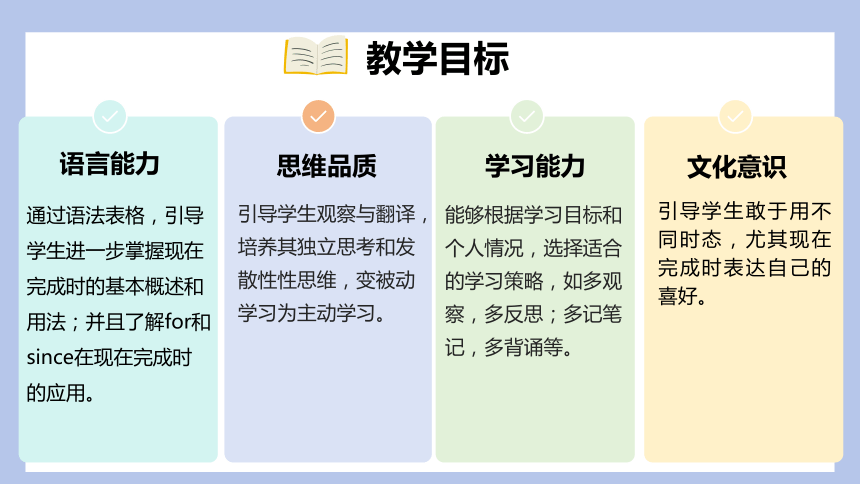
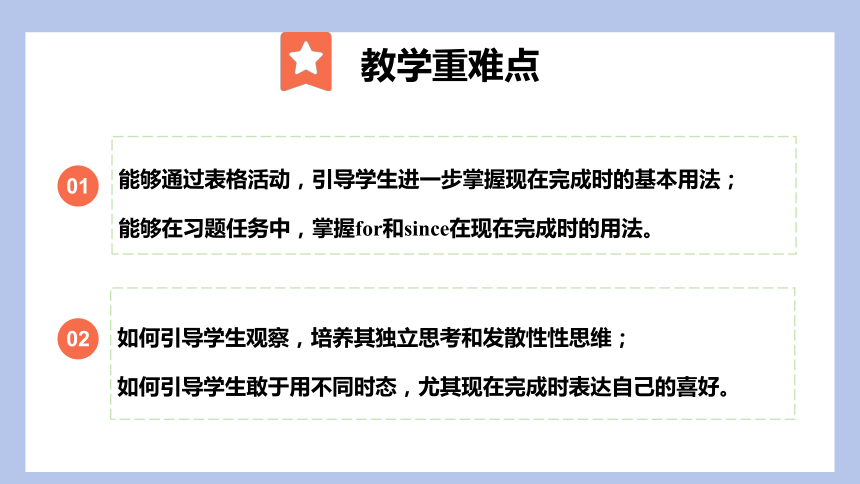

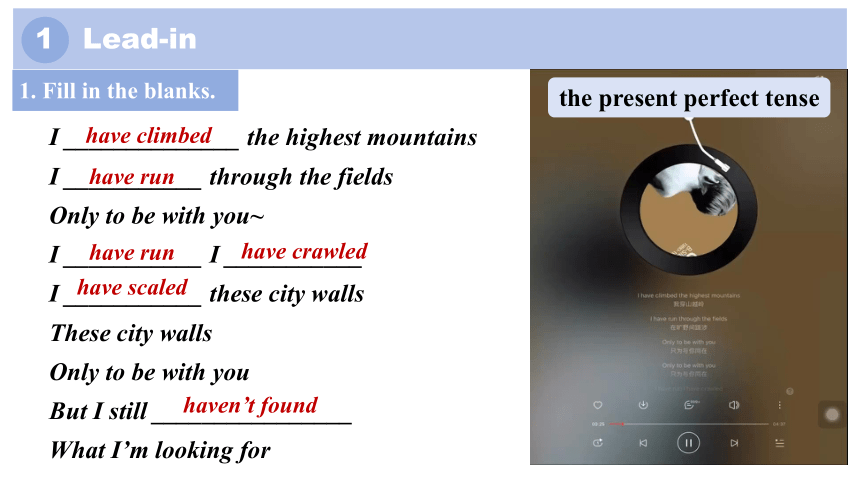
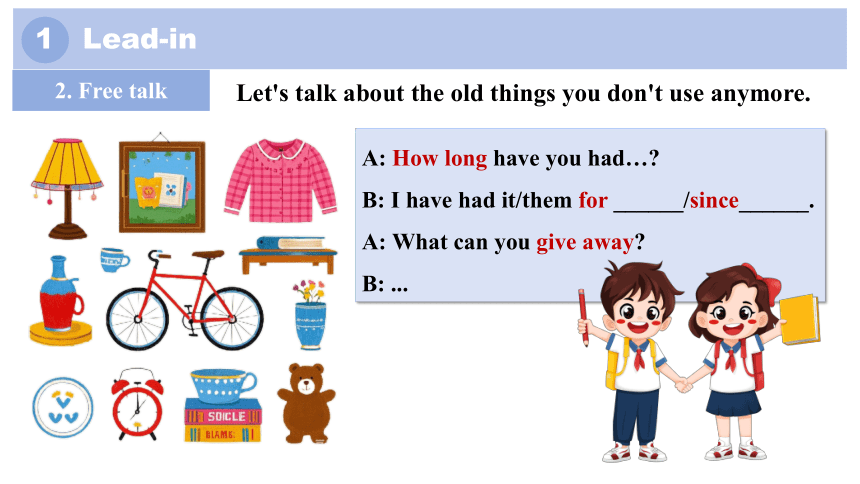
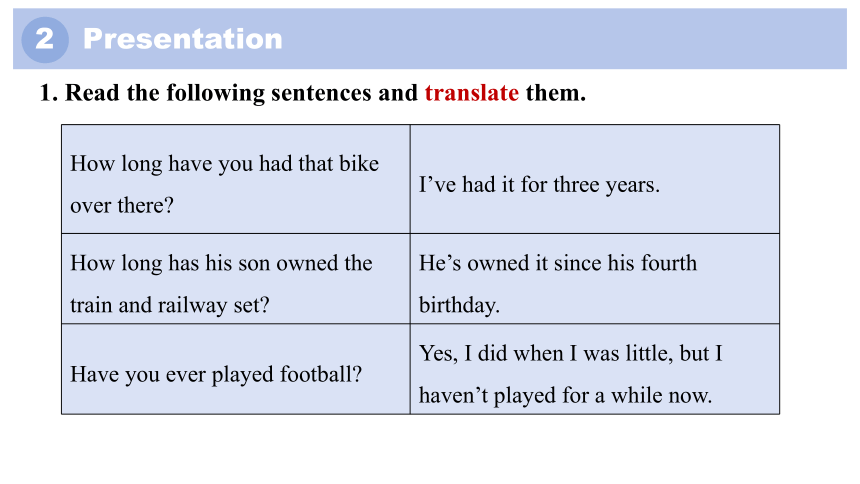
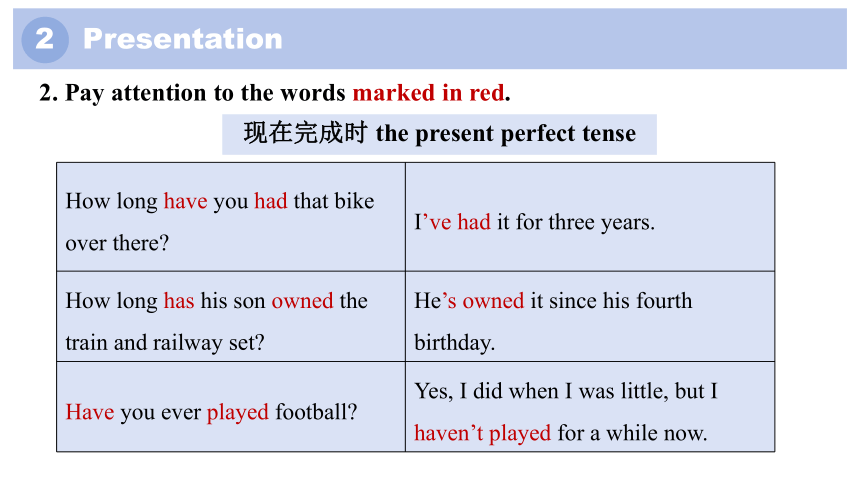

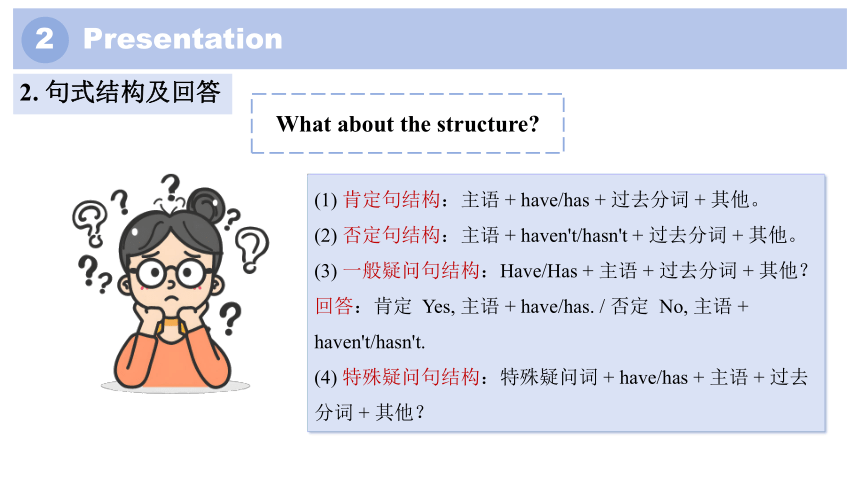
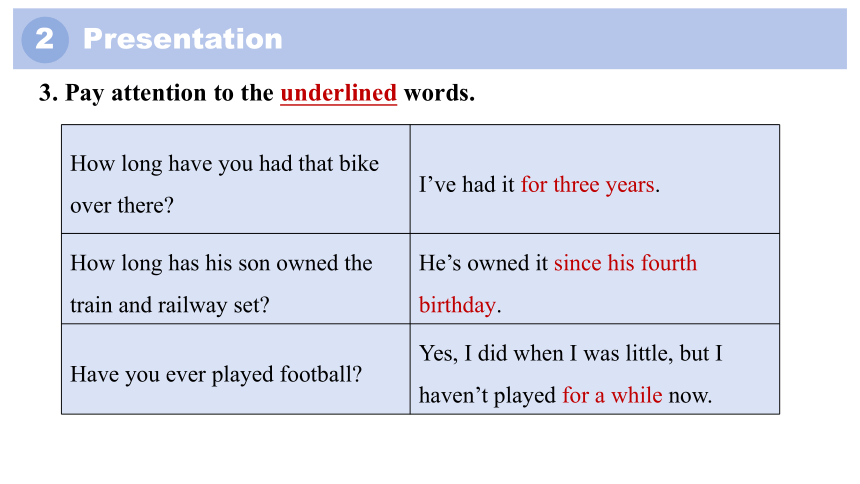
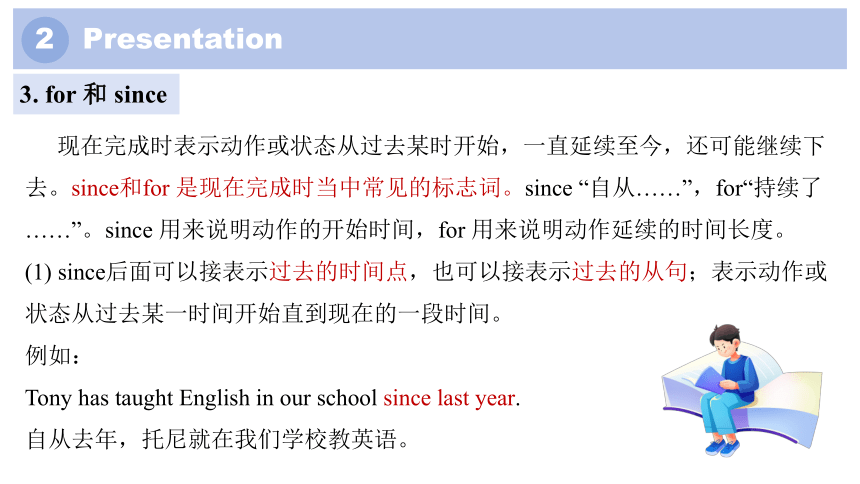
 资源预览
资源预览











